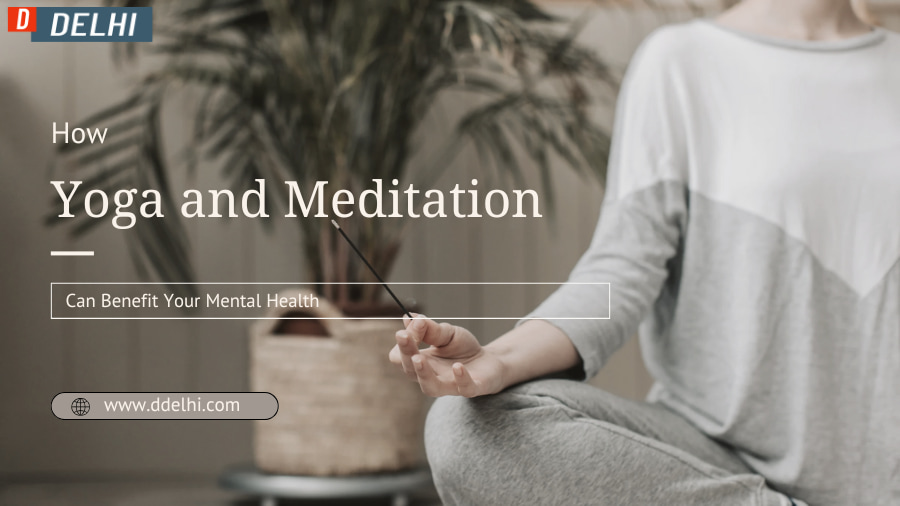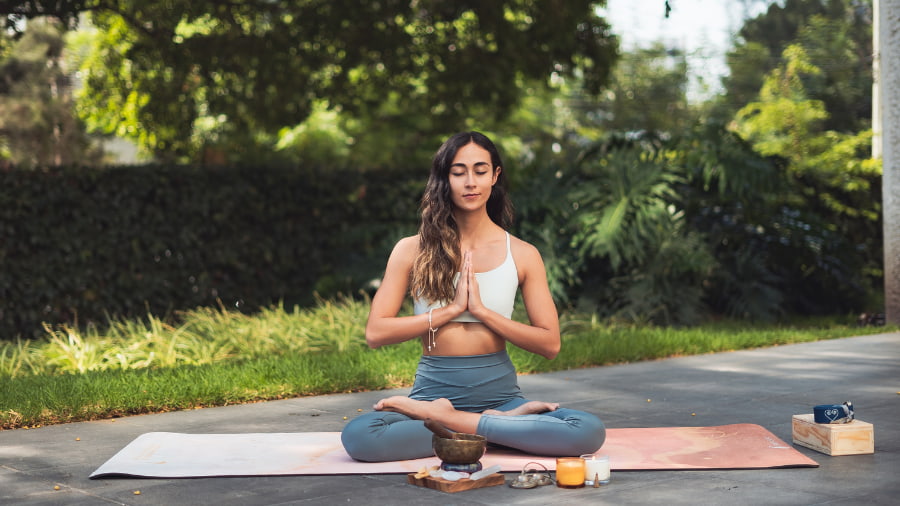
How Yoga and Meditation Can Benefit Your Mental Health
Nowadays, many people feel stressed and anxious as they navigate a fast-paced world. One simple and natural method to manage our mental health in such hectic dynamics is with yoga and meditation. Both can be good natural tools to calm the mind, reduce stress, and bring an overall sense of peace. Several individuals, including adults and kids, practice yoga for better mental health. Through this comprehensive blog, let’s explore some of the key benefits of yoga in upholding the overall mental well-being of an individual. So, let’s dive straight into the blog.
Table of Contents
The Relationship Between Yoga, Meditation, and Mental Health

The practices of yoga and meditation date back thousands of years and originated in ancient India. Each of them emphasizes the mind-body connection and overall mental clarity, emotional stability, and well-being. Today, so much research has focused on yoga and meditation, and they have recognized many benefits of Yoga and the key reasons why yoga and meditation have such positive effects on brain function, hormonal regulatory systems, and the nervous system.
Therefore, doctors and healthcare experts across the world have urged people to take some time out and practice yoga for better mental health as well as comprehensive physical well-being.
Top Benefits of Yoga and Meditation For Your Mental Health

Yoga and meditation, together, provide a comprehensive range of advantages that are adequately beneficial for a human’s physical as well as mental well-being. Here is a breakdown of these advantages:
1. Enhanced Emotional Regulation
The practice of yoga creates a valuable link between your mind and body, and this link can help you control your reaction to emotional triggers. When your mind and body are working in sync, you stay focused and calm. There is research evidence that practicing yoga activates the emotional control center of your brain. Therefore, such benefits of yoga help an individual to be emotionally well and stable.
2. Improved Sleep
Practicing yoga regularly helps to improve your overall quality and quantity of sleep. It has been demonstrated to have positive effects on relaxation to support mental and physical rest and improve sleep duration. Some studies have indicated that older adults have higher sleep efficiency and sleep quality scores after practicing yoga. So, it seems like practicing yoga for better mental health will likely be good for getting better rest.
3. Enhance Social Life
Taking classes of yoga for better mental health is a fun way to meet new people and feel connected. When you do mindfulness practice with other people while moving your body and breathing, you develop a connection with those people and create a foundation for group collaboration and trust. These positive social benefits of yoga are important for better mental health.
4. Boosted Self-Esteem and Self-Awareness
When we talk about the effects of yoga on mental and physical health, it is one of the best ways to increase your awareness of thoughts, feelings, and the body. Your self-esteem boosts when you are kinder to yourself. Also, one of the spiritual benefits of yoga is that it can teach you how to find peace within yourself and develop confidence.
5. Stress Reduction
The benefits of yoga also include decreased stress. Stress is dangerous to all human beings. Both yoga and meditation can teach the body to relax and reduce stress hormones, such as cortisol, while regulating the mind so you can remain balanced during challenging times. Both of these mindful and holistic mind-body methods show how yoga can relieve anxiety and support holistic health.
6. Improves Attention Span and Concentration
Yoga is the best practice for training your brain to focus. You can focus by doing poses, breathing, or holding still. Yoga helps you concentrate better in your daily life. Moreover, meditation improves awareness and helps to clear distractions. This is the reason why the future of yoga for mental health care is looking promising.
Things to consider when practicing yoga on your own

When practicing yoga and meditation on your own, make sure to consider the following things:
- Find Your Peaceful Space: Choose a quiet and clean corner of your home that can serve as a good spot for you to practice yoga. This will allow you to focus and enjoy the spiritual benefits of yoga.
- Start With Easy Poses: Start your yoga practice with simple movements. As your body begins to feel stronger, gradually move yourself into more complex poses. If you attempt complicated poses too soon, you risk injury. This gentle approach shows how the benefits of yoga can develop over time.
- Have the Right Equipment: A mat provides comfort and grip. Equipment like blocks or straps will allow you to get into poses better, especially as a beginner. Having the right equipment can make your experience safer, more enjoyable, and enhance the effects of yoga on mental and physical health.
- Warm Up First: Before doing yoga, be sure to do some gentle stretching to warm up your muscles. Warming up will prevent injury and allow your body to move better.
- Breathe Steadily: As you practice the poses, look for rhythmic inhalation and exhalation. Breath control is not only a way to relax your body but also a way to show how yoga for better mental health works by shedding anxiety and improving concentration.
- Practice Every Day: Even if it is only 10-15 minutes of yoga daily, you have enough time in just that day to build strength, flexibility, and peace of mind. You will see positive changes over time. Developing a consistent routine, such as yoga, is a significant aspect of the future of yoga for mental health care and provides natural ways to integrate well-being into our lives.
- Get Help When You Need It: If you have health problems or are unsure about a pose, consult a yoga teacher or your doctor. They can help you navigate the process of practice safely and meaningfully.
Conclusion
It is advised to add yoga and meditation to your wellness routine. Both practices are the best ways to address stress, anxiety, depression, and other mental health issues. These practices help to develop more awareness between mind and body, which can improve emotional regulation, increase sleep, and improve mental health as a whole. Moreover, integrating even 10-15 minutes of yoga into your daily life can make a significant difference over time. Therefore, embrace yoga and meditation as lifelong partners on your way to a healthier and more balanced life.



